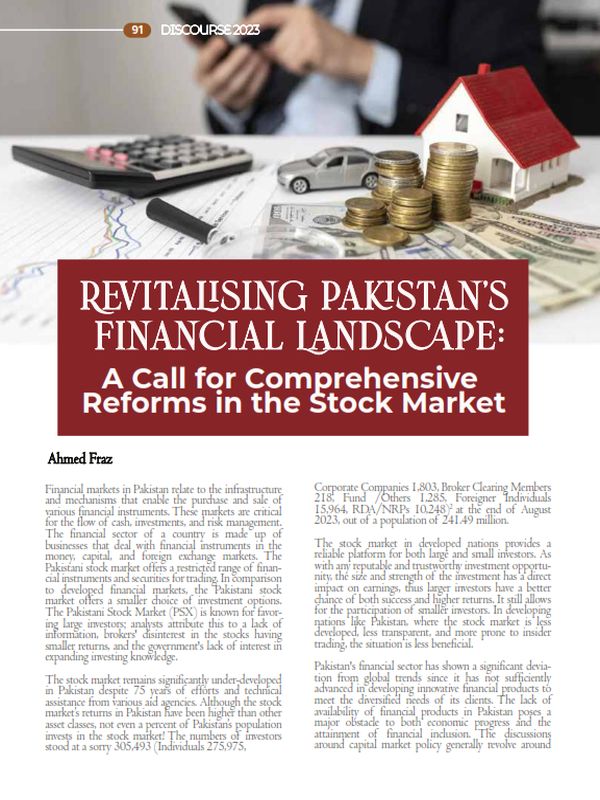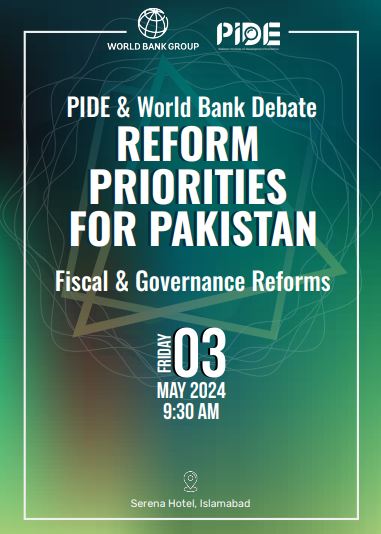Revitalising Pakistan’s Financial Landscape: A Call for Comprehensive Reforms in the Stock Market
Financial markets in Pakistan relate to the infrastructure and mechanisms that enable the purchase and sale of various financial instruments. These markets are critical for the flow of cash, investments, and risk management. The financial sector of a country is made up of businesses that deal with financial instruments in the money, capital, and foreign exchange markets. The Pakistani stock market offers a restricted range of financial instruments and securities for trading. In comparison to developed financial markets, the Pakistani stock market offers a smaller choice of investment options. The Pakistani Stock Market (PSX) is known for favoring large investors; analysts attribute this to a lack of information, brokers’ disinterest in the stocks having smaller returns, and the government’s lack of interest in expanding investing knowledge.
The stock market remains significantly under-developed in Pakistan despite 75 years of efforts and technical assistance from various aid agencies. Although the stock market’s returns in Pakistan have been higher than other asset classes, not even a percent of Pakistan’s population invests in the stock market! The numbers of investors stood at a sorry 305,493 (Individuals 275,975, Corporate Companies 1,803, Broker Clearing Members 218, Fund /Others 1,285, Foreigner Individuals 15,964, RDA/NRPs 10,248)[1] at the end of August 2023, out of a population of 241.49 million.
The stock market in developed nations provides a reliable platform for both large and small investors. As with any reputable and trustworthy investment opportunity, the size and strength of the investment has a direct impact on earnings, thus larger investors have a better chance of both success and higher returns. It still allows for the participation of smaller investors. In developing nations like Pakistan, where the stock market is less developed, less transparent, and more prone to insider trading, the situation is less beneficial.
Pakistan’s financial sector has shown a significant deviation from global trends since it has not sufficiently advanced in developing innovative financial products to meet the diversified needs of its clients. The lack of availability of financial products in Pakistan poses a major obstacle to both economic progress and the attainment of financial inclusion. The discussions around capital market policy generally revolve around the perceived dilemma between raising capital and safeguarding investors. These two aspects, namely capital raising and investor protection, are considered to be the primary responsibilities of the Securities and Exchange Commission. Businesses can get money for new projects more easily when capital formation is expanded. Consequently, this enhances economic expansion.
Issues in PSX
Family-owned enterprises generally opt for bank financing instead of listing on the PSX in order to obtain the required funds due to concerns regarding rigorous corporate governance obligations, such as disclosures and audits, as well as the potential for excessive taxation. This element plays a crucial role in the decline of enterprises on the PSX. There is an issue concerning the inadequate number of companies listed on the stock market in Pakistan. This issue adversely affects market liquidity, investment prospects, and economic growth. Given the limited nature of money and capital markets, the majority of trading activity is concentrated in government securities and stocks of a very small number of companies.
The lack of a wide variety of financial instruments in the PSX presents considerable obstacles for risk management and portfolio diversification. Specifically, the absence of derivative markets, limited to only a single future, constrains the opportunities for investors to participate in risk-sharing agreements and implement efficient hedging tactics. This constraint is a significant obstacle for both institutional and individual investors who aim to effectively handle and reduce risks linked to market volatility. The lack of liquidity in PSX gives rise to a number of problems. It raises price volatility and makes stock values more vulnerable to irrational movements. Illiquidity makes it more difficult for price discovery, making it harder for investors to assess the fair value of securities.
The persistence of insider trading can be attributed to inadequate regulation and supervision of financial institutions, which intensifies knowledge asymmetry. Market solutions to dealing with asymmetric information remain limited in view of the difficulties of contract enforcement, and inadequate regulation and supervision of financial institutions. Certain groups own a big amount of a company’s shares, limiting the availability of shares for trading on the open market.[2]
Majority of firms are not paying dividends. In the absence of regular dividend payments, investors may view the company’s financial performance as unstable, increasing market volatility. Promoting dividend policies among PSX-listed firms may improve market stability, attract long-term investors, and boost exchange confidence and resilience.
Debt is frequently used to facilitate growth and maintain a competitive advantage in businesses that require substantial capital investments, such as infrastructure, manufacturing, or technology. PSX lacks this particular aspect, and the majority of these sectors have low debt-to-equity ratios. Banks have marginalized specialized areas such as SMEs, agriculture, and housing by focusing the loan distribution solely on the corporate sector.
Recommendations
The government must maintain a consistent monetary policy that fosters economic development and stability. It has to introduce inflation-protected securities to protect investors from the adverse impacts of inflation and to provide a predictable real rate of return, to manage inflation risk, to diversify portfolios, to fund government operations, and to maintain overall economic stability.
To make investment in listed firms more appealing, provide incentives or reductions in capital gains tax for both corporations and investors. The government promotes investment in the stock market by offering tax benefits to firms and individual investors, which fosters the flow of capital and creates a favourable environment for investment. Implementing such steps can result in enhanced market liquidity, which can have a favorable effect on stock prices and trading volumes. Moreover, a decrease in capital gains tax can encourage firms to become listed on the stock exchange, so stimulating economic expansion and fostering a more dynamic and resilient capital market ecosystem in Pakistan. Lowering corporate taxes for publicly traded companies serves as a stimulus that can promptly boost profitability. Enhancing the company’s financials makes it more attractive to investors and can result in increased stock market valuations, benefiting both investors and firms. Additionally, it will generate liquidity inside the realm of financial markets.
By streamlining and expediting the initial public offering (IPO) procedure, the time required for companies to go public can be reduced, rendering the process more convenient and quick for businesses. Presently, the IPO procedure in Pakistan might be considered as complicated and lengthy, discouraging companies from exploring this option for capital raising. The government may significantly decrease the time it takes for companies to go public by streamlining regulatory procedures, minimising bureaucratic obstacles, and accelerating approval processes. This would not only encourage a greater number of businesses to go after initial public offerings (IPOs), but also introduce an additional number of dynamic companies into the stock market, thereby enhancing market capitalisation and liquidity. An enhanced IPO procedure will ensure adherence to international standards and position the Pakistani stock market as an attractive choice for firms in need of funding and investors seeking a range of investment options.
Effective risk sharing arrangements, hedging strategies, and portfolio diversification play a crucial role in ensuring the stability and resilience of any financial market. Introducing options, futures, and swaps in the Pakistani stock market is necessary to enhance risk management capabilities for investors. Asymmetric information might lead to market inefficiencies and unfair benefits for one party who holds more information than other. The regulator should adopt IT based solutions for this matter and Algorithmic Trading Oversight, Block Chain and Distributed Ledger Technology.
Increasing a stock’s or security’s free float is a tactic that regulators can use to improve market liquidity, prevent market manipulation, and foster a fair and efficient trading environment. Regulators can impose lock-up periods during which some shareholders, such as corporate executives and important stakeholders, are not permitted to sell their stock. When the lock-up period expires, these shares can join the free float.
Develop sector-specific loan initiatives, especially for industries that are critical to economic growth, such as agriculture, small and medium-sized businesses (SMEs), and start-ups in the technology sector. Lower lending rates or relaxed collateral requirements may be available through these programs. Set a minimum dividend payment threshold or mandate that publicly listed companies set aside a certain proportion of their earnings for dividend payments. This could encourage firms to start using dividend plans. Expand outreach, investor awareness, and financial literacy in order to make it possible for both individuals and businesses to access investment opportunities and products.
In the end, the suggestions presented for PSX are crucial for the creation of a prosperous and robust financial sector for the nation. The government’s and policy maker’s dedication to upholding stable policies, along with the implementation of right reforms, will establish a basis for economic growth and stability.
The author is an Assistant Professor at the Pakistan Institute of Development Economics (PIDE), Islamabad.
[1] https://www.cdcpakistan.com/about-us/statistics/
[2] Haque, N. U., & Husain, A. (2021). A small club: Distribution, power and networks in financial markets of Pakistan (No. 2021 Pakistan Institute of Development Economics.: 3).





